Book 2 unit 4 Cultural Encounters
(完整版)大学综合英语第二册基础英语2何兆熊课文及译文4cultureencounters
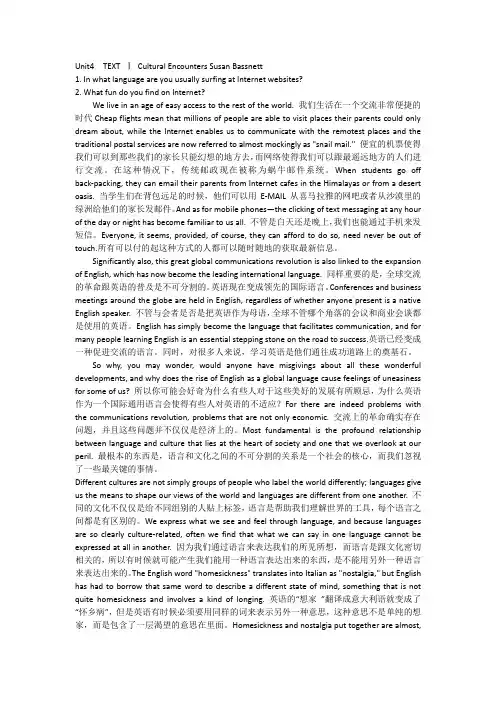
Unit4 TEXT ⅠCultural Encounters Susan Bassnett1. In what language are you usually surfing at Internet websites?2. What fun do you find on Internet?We live in an age of easy access to the rest of the world. 我们生活在一个交流非常便捷的时代Cheap flights mean that millions of people are able to visit places their parents could only dream about, while the Internet enables us to communicate with the remotest places and the traditional postal services are now referred to almost mockingly as "snail mail." 便宜的机票使得我们可以到那些我们的家长只能幻想的地方去,而网络使得我们可以跟最遥远地方的人们进行交流。
在这种情况下,传统邮政现在被称为蜗牛邮件系统。
When students go off back-packing, they can email their parents from Internet cafes in the Himalayas or from a desert oasis. 当学生们在背包远足的时候,他们可以用E-MAIL从喜马拉雅的网吧或者从沙漠里的绿洲给他们的家长发邮件。
And as for mobile phones—the clicking of text messaging at any hour of the day or night has become familiar to us all. 不管是白天还是晚上,我们也能通过手机来发短信。
Unit 4 Cultural Encounters课文翻译综合教程二精编资料
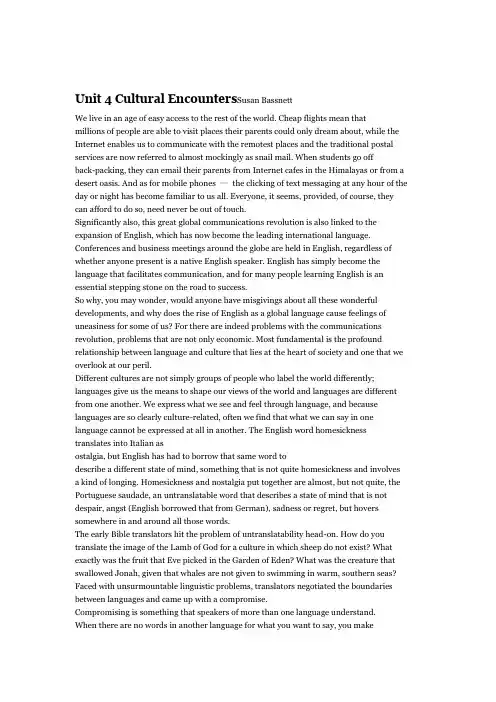
Unit 4 Cultural Encounters Susan BassnettWe live in an age of easy access to the rest of the world. Cheap flights mean thatmillions of people are able to visit places their parents could only dream about, while the Internet enables us to communicate with the remotest places and the traditional postal services are now referred to almost mockingly as snail mail. When students go offback-packing, they can email their parents from Internet cafes in the Himalayas or from a desert oasis. And as for mobile phones —the clicking of text messaging at any hour of the day or night has become familiar to us all. Everyone, it seems, provided, of course, they can afford to do so, need never be out of touch.Significantly also, this great global communications revolution is also linked to the expansion of English, which has now become the leading international language. Conferences and business meetings around the globe are held in English, regardless of whether anyone present is a native English speaker. English has simply become the language that facilitates communication, and for many people learning English is an essential stepping stone on the road to success.So why, you may wonder, would anyone have misgivings about all these wonderful developments, and why does the rise of English as a global language cause feelings of uneasiness for some of us? For there are indeed problems with the communications revolution, problems that are not only economic. Most fundamental is the profound relationship between language and culture that lies at the heart of society and one that we overlook at our peril.Different cultures are not simply groups of people who label the world differently; languages give us the means to shape our views of the world and languages are different from one another. We express what we see and feel through language, and because languages are so clearly culture-related, often we find that what we can say in one language cannot be expressed at all in another. The English word homesickness translates into Italian asostalgia, but English has had to borrow that same word todescribe a different state of mind, something that is not quite homesickness and involves a kind of longing. Homesickness and nostalgia put together are almost, but not quite, the Portuguese saudade, an untranslatable word that describes a state of mind that is not despair, angst (English borrowed that from German), sadness or regret, but hovers somewhere in and around all those words.The early Bible translators hit the problem of untranslatability head-on. How do you translate the image of the Lamb of God for a culture in which sheep do not exist? What exactly was the fruit that Eve picked in the Garden of Eden? What was the creature that swallowed Jonah, given that whales are not given to swimming in warm, southern seas? Faced with unsurmountable linguistic problems, translators negotiated the boundaries between languages and came up with a compromise.Compromising is something that speakers of more than one language understand.When there are no words in another language for what you want to say, you makeadjustments and try to approximate. English and Welsh speakers make adjustments regarding the colour spectrum in the grey / green / blue / brown range, since English hasfour words and Welsh has three. And even where words do exist, compromises still needto be made. The word democracy means completely different things in differentcontexts, and even a word like read which refers to a staple food item made of flourmeans totally different things to different people. The flat breads of Central Asia are along way away from Mother's Pride white sliced toasties, yet the word read has toserve for both.Inevitably, the spread of English means that millions of people are adding anotherlanguage to their own and are learning how to negotiate cultural and linguisticdifferences. This is an essential skill in today's hybrid world, particularly now when theneed for international understanding has rarely been so important. But even as morepeople become multilingual, so native English speakers are losing out, for they arebecoming ever more monolingual, and hence increasingly unaware of the differencesbetween cultures that languages reveal. Communicating in another language involves notonly linguistic skills, but the ability to think differently, to enter into another culture's mentality and shape language accordingly. Millions of people are discovering how tobridge cultures, while the English-speaking world becomes ever more complacent andcuts down on foreign language learning programmes in the mistaken belief that it isenough to know English.World peace in the future depends on intercultural understanding. Those best placedto help that process may not be the ones with the latest technology and state of the artmobile phones, but those with the skills to understand what lies in, under and beyond the words spoken in many different languages.文化冲突我们生活在一个交流非常便捷的时代。
Unit4 Cultural Encounters答案综合教程二
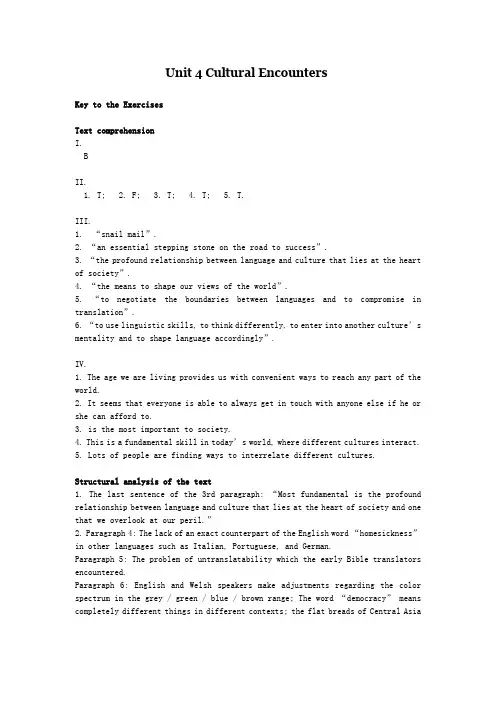
Unit 4 Cultural EncountersKey to the ExercisesText comprehensionI.BII.1. T;2. F;3. T;4. T;5. T.III.1. “snail mail”.2. “an essential stepping stone on the road to success”.3. “the profound relationship between language and cultur e that lies at the heart of society”.4. “the means to shape our views of the world”.5. “to negotiate the boundaries between languages and to compromise in translation”.6. “to use linguistic skills, to think differently, to enter into another culture’s m entality and to shape language accordingly”.IV.1. The age we are living provides us with convenient ways to reach any part of the world.2. It seems that everyone is able to always get in touch with anyone else if he or she can afford to.3. is the most important to society.4. This is a fundamental skill in today’s world, where different cultures interact.5. Lots of people are finding ways to interrelate different cultures.Structural analysis of the text1. The last sentence of the 3rd paragraph: “Mo st fundamental is the profound relationship between language and culture that lies at the heart of society and one that we overlook at our peril.”2. Paragraph 4: The lack of an exact counterpart of the English word “homesickness” in other languages such as Italian, Portuguese, and German.Paragraph 5: The problem of untranslatability which the early Bible translators encountered.Paragraph 6: English and Welsh speakers make adjustments regarding the color spectrum in the grey / green / blue / brown range; The word “democracy” means completely different things in different contexts; the flat breads of Central Asiaare a long way away from Mother’s Pride white sliced toasties, yet the word “bread” has to serve for both.VocabularyI. Phrase practice1. provided =as long as 假如,倘若need never be out of touch =can never fail to be reached 从不会失去联系2. regardless of =no matter 不管,不顾3. overlook at our peril =fail to notice at great risk 忽视……的危险或风险4. hovers somewhere in and around all those words =may be described by these words to varying degrees5. hit the problem of untranslatability head-on = were directly confronted with the problem that something in one language cannot be rendered into anotherII.1. stepping stone;2. at their peril;3. serve;4. mentality;5. staple;6. facilitating;7. messaging;8. hybrid.III. Word derivationFill in the blanks with the appropriate forms of the given words.1. economy2. accessible3. fundamentally4. homesick5. negotiable6. adjusted7. remoteness8. complacentlyIV.1. D;2. C;3. A;4. D;5. B;6. A;7. B;8. C.V. Synonym / AntonymGive a synonym or an antonym of the word underlined in each sentence in the sense it is used.1. Synonym: time, era, epoch2. Synonym: meetings3. Synonym: basic, fundamental4. Antonym: misshape5. Synonym: unavoidably6. Synonym: worry, concern, anxiety7. Antonym: hide, concealVI. PrefixWrite in each space one word that has the same prefix as underlined in the given word.1. unbelievable2. imperfect3. disagreement4. misplace5. malfunction6. enable7. surpass 8. submarineGrammarI. Complete the following sentences with the correct verb forms.1. helps2. hope; are enjoying; sunbathe; go; are going.3. is being.4. is typing5. am not eating.6. am reading7. are always leaving.8. go; belongs; wants; is using.9. is boiling.10. is putting; is rewiring; is building.II. Correct the errors.1. is passing → passes; is shooting → shoots.2. OK.3. are crying.4. OK.5. am knowing → know.6. am gathering → gather.7. work → am working.8. do → are; sneeze → sneezing.III.thank; are dispatching; regret; have; are contacting; hear; enclose/are enclosing; decide; have; are listed; regret; hope; enclose/are enclosing.IV.1. a. The speaker is complaining; b. The speaker gives a fact.2. a. am considering; b. have the opinion.3. a. It suggests a permanent nature; b. It suggests a temporary behaviour.4. a. is taking care of; b. have no objection to.5. a. am waiting for; b. believe.6. a. am waiting for; b. believe.V. Position of adjectivesRewrite the following descriptions putting the adjectives in the correct order.1. a large pair of red woolen socks2. a powerful new white German car3. a small rectangular grey Japanese radio4. a big modern concrete office building5. a medium size French stainless steel saucepan6. a superb medieval rose-shaped stained-glass window7. a prominent triangular red road sign8. a tiny black and white Chinese dogTranslationI.1.因此,你也许会问,为什么还有人会对这些绝妙的发展顾虑重重为什么英语成为世界语言会让一部分人惴惴不安2.不同的文化并不仅仅是给世界贴上不同标签的人群;语言给了我们塑造世界观的工具,而语言又是不一样的。
Unit4CulturalEncounters课文翻译综合教程二(20210110005936)
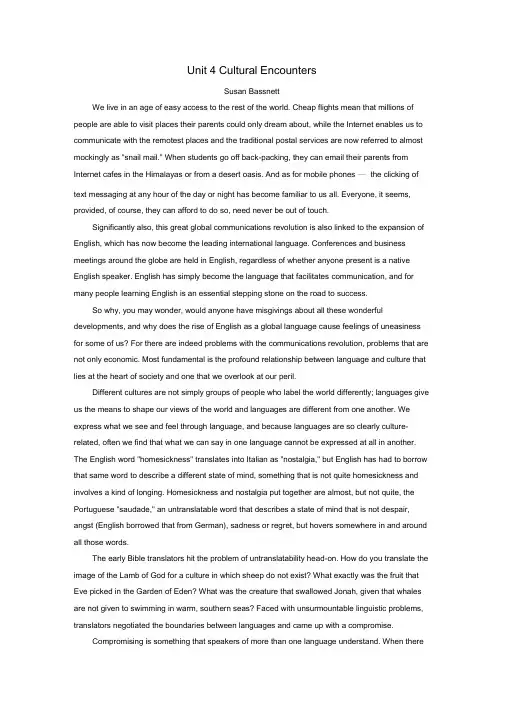
Unit 4 Cultural EncountersSusan BassnettWe live in an age of easy access to the rest of the world. Cheap flights mean that millions of people are able to visit places their parents could only dream about, while the Internet enables us to communicate with the remotest places and the traditional postal services are now referred to almost mockingly as "snail mail." When students go off back-packing, they can email their parents from Internet cafes in the Himalayas or from a desert oasis. And as for mobile phones —the clicking of text messaging at any hour of the day or night has become familiar to us all. Everyone, it seems, provided, of course, they can afford to do so, need never be out of touch.Significantly also, this great global communications revolution is also linked to the expansion of English, which has now become the leading international language. Conferences and business meetings around the globe are held in English, regardless of whether anyone present is a native English speaker. English has simply become the language that facilitates communication, and for many people learning English is an essential stepping stone on the road to success.So why, you may wonder, would anyone have misgivings about all these wonderful developments, and why does the rise of English as a global language cause feelings of uneasiness for some of us? For there are indeed problems with the communications revolution, problems that are not only economic. Most fundamental is the profound relationship between language and culture that lies at the heart of society and one that we overlook at our peril.Different cultures are not simply groups of people who label the world differently; languages give us the means to shape our views of the world and languages are different from one another. We express what we see and feel through language, and because languages are so clearly culture-related, often we find that what we can say in one language cannot be expressed at all in another. The English word "homesickness" translates into Italian as "nostalgia," but English has had to borrow that same word to describe a different state of mind, something that is not quite homesickness and involves a kind of longing. Homesickness and nostalgia put together are almost, but not quite, the Portuguese "saudade," an untranslatable word that describes a state of mind that is not despair, angst (English borrowed that from German), sadness or regret, but hovers somewhere in and around all those words.The early Bible translators hit the problem of untranslatability head-on. How do you translate the image of the Lamb of God for a culture in which sheep do not exist? What exactly was the fruit that Eve picked in the Garden of Eden? What was the creature that swallowed Jonah, given that whales are not given to swimming in warm, southern seas? Faced with unsurmountable linguistic problems, translators negotiated the boundaries between languages and came up with a compromise.Compromising is something that speakers of more than one language understand. When thereare no words in another language for what you want to say, you make adjustments and try to approximate. English and Welsh speakers make adjustments regarding the colour spectrum in the grey / green / blue / brown range, since English has four words and Welsh has three. And even where words do exist, compromises still need to be made. The word "democracy" means completely different things in different contexts, and even a word like "bread" which refers to a staple food item made of flour means totally different things to different people. The flat breads of Central Asia are a long way away from Mother's Pride white sliced toasties, yet the word "bread" has to serve for both.Inevitably, the spread of English means that millions of people are adding another language to their own and are learning how to negotiate cultural and linguistic differences. This is an essential skill in today's hybrid world, particularly now when the need for international understanding has rarely been so important. But even as more people become multilingual, so native English speakers are losing out, for they are becoming ever more monolingual, and hence increasingly unaware of the differences between cultures that languages reveal. Communicating in another language involves not only linguistic skills, but the ability to think differently, to enter into another culture's mentality and shape language accordingly. Millions of people are discovering how to bridge cultures, while the English-speaking world becomes ever more complacent and cuts down on foreign language learning programmes in the mistaken belief that it is enough to know English.World peace in the future depends on intercultural understanding. Those best placed to help that process may not be the ones with the latest technology and state of the art mobile phones, but those with the skills to understand what lies in, under and beyond the words spoken in many different languages.文化冲突我们生活在一个交流非常便捷的时代。
UnitCulturalEncounters答案综合教程二
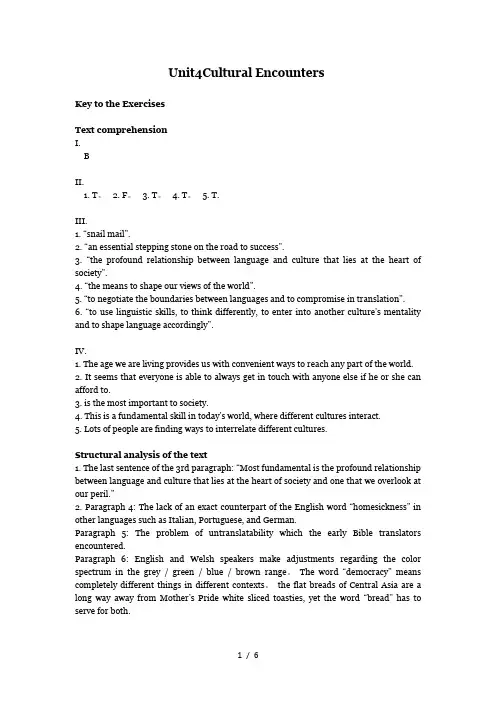
Unit4Cultural EncountersKey to the ExercisesText comprehensionI.BII.1. T。
2. F。
3. T。
4. T。
5. T.III.1. “snail mail”.2. “an essential stepping stone on the road to success”.3. “the profound relationship between language and culture that lies at the heart of society”.4. “the means to shape our views of the world”.5. “to negotiate the boundaries between languages and to compromise in translation”.6. “to use linguistic skills, to think differently, to enter into another culture’s mentality and to shape language accordingly”.IV.1. The age we are living provides us with convenient ways to reach any part of the world.2. It seems that everyone is able to always get in touch with anyone else if he or she can afford to.3. is the most important to society.4. This is a fundamental skill in today’s world, where different cultures interact.5. Lots of people are finding ways to interrelate different cultures.Structural analysis of the text1. The last sentence of the 3rd paragraph: “Most fundamental is the profound relationship between language and culture that lies at the heart of society and one that we overlook at our peril.”2. Paragraph 4: The lack of an exa ct counterpart of the English word “homesickness” in other languages such as Italian, Portuguese, and German.Paragraph 5: The problem of untranslatability which the early Bible translators encountered.Paragraph 6: English and Welsh speakers make adjustments regarding the color spectrum in the grey / green / blue / brown range。
Unit 4 Cultural Encounters课文翻译综合教程二
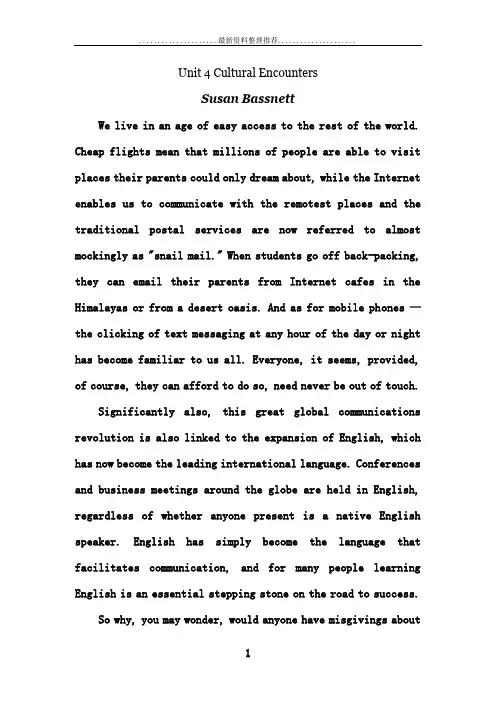
Unit 4 Cultural EncountersSusan BassnettWe live in an age of easy access to the rest of the world. Cheap flights mean that millions of people are able to visit places their parents could only dream about, while the Internet enables us to communicate with the remotest places and the traditional postal services are now referred to almost mockingly as "snail mail." When students go off back-packing, they can email their parents from Internet cafes in the Himalayas or from a desert oasis. And as for mobile phones —the clicking of text messaging at any hour of the day or night has become familiar to us all. Everyone, it seems, provided, of course, they can afford to do so, need never be out of touch.Significantly also, this great global communications revolution is also linked to the expansion of English, which has now become the leading international language. Conferences and business meetings around the globe are held in English, regardless of whether anyone present is a native English speaker. English has simply become the language that facilitates communication, and for many people learning English is an essential stepping stone on the road to success.So why, you may wonder, would anyone have misgivings aboutall these wonderful developments, and why does the rise of English as a global language cause feelings of uneasiness for some of us? For there are indeed problems with the communications revolution, problems that are not only economic. Most fundamental is the profound relationship between language and culture that lies at the heart of society and one that we overlook at our peril.Different cultures are not simply groups of people who label the world differently; languages give us the means to shape our views of the world and languages are different from one another. We express what we see and feel through language, and because languages are so clearly culture-related, often we find that what we can say in one language cannot be expressed at all in another. The English word "homesickness" translates into Italian as "nostalgia," but English has had to borrow that same word to describe a different state of mind, something that is not quite homesickness and involves a kind of longing. Homesickness and nostalgia put together are almost, but not quite, the Portuguese "saudade," an untranslatable word that describes a state of mind that is not despair, angst (English borrowed that from German), sadness or regret, but hovers somewhere in and around all those words.The early Bible translators hit the problem of untranslatability head-on. How do you translate the image of the Lamb of God for a culture in which sheep do not exist? What exactly was the fruit that Eve picked in the Garden of Eden? What was the creature that swallowed Jonah, given that whales are not given to swimming in warm, southern seas? Faced with unsurmountable linguistic problems, translators negotiated the boundaries between languages and came up with a compromise.Compromising is something that speakers of more than one language understand. When there are no words in another language for what you want to say, you make adjustments and try to approximate. English and Welsh speakers make adjustments regarding the colour spectrum in the grey / green / blue / brown range, since English has four words and Welsh has three. And even where words do exist, compromises still need to be made. The word "democracy" means completely different things in different contexts, and even a word like "bread" which refers to a staple food item made of flour means totally different things to different people. The flat breads of Central Asia are a long way away from Mother's Pride white sliced toasties, yet the word "bread" has to serve for both.Inevitably, the spread of English means that millions ofpeople are adding another language to their own and are learning how to negotiate cultural and linguistic differences. This is an essential skill in today's hybrid world, particularly now when the need for international understanding has rarely been so important. But even as more people become multilingual, so native English speakers are losing out, for they are becoming ever more monolingual, and hence increasingly unaware of the differences between cultures that languages reveal. Communicating in another language involves not only linguistic skills, but the ability to think differently, to enter into another culture's mentality and shape language accordingly. Millions of people are discovering how to bridge cultures, while the English-speaking world becomes ever more complacent and cuts down on foreign language learning programmes in the mistaken belief that it is enough to know English.World peace in the future depends on intercultural understanding. Those best placed to help that process may not be the ones with the latest technology and state of the art mobile phones, but those with the skills to understand what lies in, under and beyond the words spoken in many different languages.文化冲突我们生活在一个交流非常便捷的时代。
Unit 4 Cultural Encounters课文翻译综合教程二
Unit 4 Cultural Encounters课文翻译综合教程二嗨,伙计们!今天咱们来聊聊文化碰撞这个话题。
你们知道吗,有时候我们和外国人交流的时候,会因为文化差异而产生一些有趣的误会。
比如说,有一次我在餐厅点了一份炒饭,结果服务员给我上了一碗汤。
我当时就愣住了,心想:“这是怎么回事啊?”后来才知道,原来在他们的文化里,炒饭就是汤的意思。
哈哈,这可真是让人哭笑不得啊!不过,这种文化碰撞也让我们学到了很多东西。
比如说,我们可以从外国人的视角看待问题,发现自己的观念可能有些狭隘。
还有呢,我们可以学会尊重不同的文化,这样才能更好地与人相处。
其实,文化碰撞并不仅仅发生在国际交往中。
在我们日常生活中,也经常会遇到各种各样的文化差异。
比如说,有些人喜欢用筷子吃饭,而有些人则习惯用刀叉。
有些人喜欢喝热水,而有些人则喜欢喝冰水。
这些看似微不足道的小事,其实都反映了不同文化的特色。
我们应该如何应对这些文化差异呢?我们要学会尊重。
每个国家都有自己的历史和传统,我们不能因为别人的做法和我们的不一样就嘲笑他们。
我们要学会沟通。
当我们遇到不明白的事情时,不要猜测别人的意图,而是直接问清楚。
我们要保持开放的心态。
只有这样,我们才能真正地了解和接纳不同的文化。
当然啦,文化碰撞也有它的乐趣所在。
比如说,你可能会发现一些非常有趣的习俗。
比如说,在西班牙,人们在庆祝圣诞节的时候会举行一场盛大的游行,人们会打扮成各种奇怪的角色,如猫女、海盗等。
而在日本,人们会在樱花盛开的季节举行“赏花大会”,大家一起欣赏美丽的樱花。
这些活动不仅让我们感受到了不同文化的魅力,还让我们的生活变得更加丰富多彩。
文化碰撞是我们生活中不可避免的一部分。
我们既要学会应对这些差异,也要学会从中寻找乐趣。
只有这样,我们才能在这个多元化的世界里更好地生存和发展。
今天的分享就到这里啦,希望对你们有所启发。
下次再见啦!。
unit 4 cultural encounters
Label v.(-ll-)
2
to describe sb./sth. in a particular way, esp. unfairly label sb./sth. (as) sth.| label sb./sth. + noun 同事们把他叫做背叛者。 He was labelled (as) a traitor by his former colleagues.
Longing n.
[c.n.,
u.n.] a strong feeling of wanting sth./sb. a longing for home 她强烈地想要再见他一面。 She was filled with longing to see him in person again.
Label v.(-ll-)
2
to describe sb./sth. in a pБайду номын сангаасrticular way, esp. unfairly label sb./sth. +as+ adj. 说一个小宝宝调皮,是不公平的。 It is unfair to label a small baby as naughty.
behavior, an expression, etc.) showing that you think sb./sth. is ridiculous 嘲弄的(contemptuous) a mocking smile Her voice was faintly mocking.
Himalayas n.
Oasis n.
2
a pleasant place or period of time in the middle of sth. unpleasant or difficult (haven) an oasis of calm a green oasis in the heart of the city
2 Unit4 Cultural Encounters答案综合教程二
Unit 4 Cultural EncountersKey to the ExercisesText comprehensionI.BII.1. T;2. F;3. T;4. T;5. T.III.1. “snail mail”.2. “an essential stepping stone on the road to success”.3. “the profound relationship between language and culture that lies at the heart of society”.4. “the means to shape our views of the world”.5. “to negotiate the boundaries between languages and to compromise in translation”.6. “to use linguistic skills, to think differently, to enter into another culture's mentality and to shape language accordingly”.IV.1. The age we are living provides us with convenient ways to reach any part of the world.2. It seems that everyone is able to always get in touch with anyone else if he or she can afford to.3. is the most important to society.4. This is a fundamental skill in today's world, where different cultures interact.5. Lots of people are finding ways to interrelate different cultures.Structural analysis of the text1. The last sentence of the 3rd paragraph: “Most fundamental is the profound relationship between language and culture that lies at the heart of society and one that we overlook at our peril.”2. Paragraph 4: The lack of an exact counterpart of the English word “homesickness”in other languages such as Italian, Portuguese, and German.Paragraph 5: The problem of untranslatability which the early Bible translators encountered.Paragraph 6: English and Welsh speakers make adjustments regarding the color spectrum in the grey / green / blue / brown range; The word “democracy” means AsiaCentral of breads flat the contexts; different in things different completelyare a long way away from Mother's Pride white sliced toasties, yet the word “bread”has to serve for both.VocabularyI. Phrase practice1. provided =as long as 假如,倘若need never be out of touch =can never fail to be reached 从不会失去联系2. regardless of =no matter 不管,不顾3. overlook at our peril =fail to notice at great risk 忽视……的危险或风险4. hovers somewhere in and around all those words =may be described by these words to varying degrees5. hit the problem of untranslatability head-on = were directly confronted with the problem that something in one language cannot be rendered into anotherII.1. stepping stone;2. at their peril;3. serve;4. mentality;5. staple;6. facilitating;7. messaging;8. hybrid.III. Word derivationFill in the blanks with the appropriate forms of the given words.1. economy2. accessible3. fundamentally4. homesick5. negotiable6. adjusted7. remoteness8. complacentlyIV.1. D;2. C;3. A;4. D;5. B;6. A;7. B;8. C.V. Synonym / AntonymGive a synonym or an antonym of the word underlined in each sentence in the senseit is used.1. Synonym: time, era, epoch2. Synonym: meetings3. Synonym: basic, fundamental4. Antonym: misshape5. Synonym: unavoidably6. Synonym: worry, concern, anxiety7. Antonym: hide, concealVI. PrefixWrite in each space one word that has the same prefix as underlined in the given word.1. unbelievable2.imperfect3. disagreement4.misplace5. malfunction6. enable7. surpass 8. submarineGrammarI. Complete the following sentences with the correct verb forms.1. helps2. hope; are enjoying; sunbathe; go; are going.3. is being.4. is typing5. am not eating.6. am reading7. are always leaving.8. go; belongs; wants; is using.9. is boiling.10. is putting; is rewiring; is building.II. Correct the errors.1. is passing → passes; is shooting → shoots.2. OK.3. are crying.4. OK.5. am knowing → know.6. am gathering → gather.7. work → am working.8. do → are; sneeze → sneezing.III.thank; are dispatching; regret; have; are contacting; hear; enclose/are enclosing; decide; have; are listed; regret; hope; enclose/are enclosing.IV.1. a. The speaker is complaining; b. The speaker gives a fact.2. a. am considering; b. have the opinion.3. a. It suggests a permanent nature; b. It suggests a temporary behaviour.4. a. is taking care of; b. have no objection to.5. a. am waiting for; b. believe.6. a. am waiting for; b. believe.V. Position of adjectivesRewrite the following descriptions putting the adjectives in the correct order.1. a large pair of red woolen socksa powerful new white German car2.3. a small rectangular grey Japanese radio4. a big modern concrete office building5. a medium size French stainless steel saucepan6. a superb medieval rose-shaped stained-glass window7. a prominent triangular red road sign8. a tiny black and white Chinese dogTranslationI.1.因此,你也许会问,为什么还有人会对这些绝妙的发展顾虑重重?为什么英语成为世界语言会让一部分人惴惴不安?2.不同的文化并不仅仅是给世界贴上不同标签的人群;语言给了我们塑造世界观的工具,而语言又是不一样的。
unit 4 cultural encounters
1.What’s relationship between language and culture?
2.What are the examples?
Homesickness= Angst=
3.What’s the problem translators face?
4.What is compromise?
CS: learn how to___________________________________________. This is an essential skill in today’s hybrid world, more people become _____________________.
5.What are the examples?
6.What’s the future tendency of the spread of English?
7.What’s the problem that native English speakers may face?
8.What’s real communication?
Email parents from _________________________________________.
Mobile phones send text messages _____________________________.
CS: afford to do so, need never be__________________. (age of technology)
DS: homesickness=nostalgia=saudade
Angst=sadness/regret
- 1、下载文档前请自行甄别文档内容的完整性,平台不提供额外的编辑、内容补充、找答案等附加服务。
- 2、"仅部分预览"的文档,不可在线预览部分如存在完整性等问题,可反馈申请退款(可完整预览的文档不适用该条件!)。
- 3、如文档侵犯您的权益,请联系客服反馈,我们会尽快为您处理(人工客服工作时间:9:00-18:30)。
• “Communication is a risky business.”
• In order to avoid “communication breakdown” caused by “cultural bumps” on the “business highway”, we must develop cultural awareness of the influential factors behind the speech acts and gain the knowledge of each other’s behavior patterns, polite strategies and cultural associations, etc.
•
• To learn a foreign language without learning its culture is a very good way to make oneself a language fluent fool.
Take Chinese and English idioms
The newcomer may encounter many transportation _________, shopping problems in ____________, or interpersonal communication. You may feel that people may no longer care about your problem, and they don‘t like foreigners. The newcomer may start to complain about and _______ reject the host ________________ culture. You spend much of your time speaking your own language, watching video from your home country, and eating food from only the home. You may remember_________ good things about your home country _____________________________
• 21st century is an Information age.
• Language. Communication is impossible when different peoples speak different languages. Communication can take place when people from different cultural backgrounds share a same language. • In this sense, we can say that the new age is a cross-cultural communication age which demands people to have cross-cultural communication awareness and knowledge.
• 3. What language is considered as a global language? Why?
• 4. What makes people feel difficult in communication with non-native speakers?
• 5. Do you know these terms?
Translation 文化冲突指某人突然身处异族文化或环境中 而经受的一种不安、恐惧、焦虑的状况。
Symptoms of culture shock
physical & psychological
helpless desire for dependence on… frustrated fear depression loneliness isolated anger, aggression, hatred, hostility withdrawal, …… back excessive washing of hands excessive concern over…… Fear of physical contact…… headaches, stomach/back aches, dizziness, ulcers excessive sleepiness difficult to sleep well insomnia tend to feel tired ……
— Spare time for relaxation — Don’t be afraid to take risks — reexam your values and outlook —Talk therapy — talk with other Chinese —go to the outside and try to look for something you are interested in; — find some Chinese books / music/ food to enjoy
What is culture encounter ?ห้องสมุดไป่ตู้
The term cultural encounter or culture shock was first introduced by the anthropologist Oberg in 1954. It is a term used to describe the anxiety and feelings (of surprise, disorientation, confusion, etc.)
felt when people have to operate within an entirely
different cultural or social environment, such as a
foreign country.
1. What‘s Culture Shock ? It means strong feelings of discomfort, fear, or anxiety, which people may have when they enter another culture.
• monolingual bilingual multilingual
• Stimulating and Enlightening Quotations: • “People begin to understand their own cultures only after they have begun interacting with people from another culture.” • What is “right” in one culture may be “ wrong” in another.
Regression Phase
Recovery
Phase
You become more comfortable with the customs of your host country. You start to realize that no country is much better than another __________________________--they are just different __________. You are no longer completely comfortable in your home country _______________________________________. It may take a little while to become at ease with your home culture.
Reverse
Culture
Shock
IV. Recovery / adjustment Stage
You have reached a point where you good and positive . The actually feel ______________ things that initially made you feel _________, or ___________ strange uncomfortable are now things that you ___________. Now understand you feel _____________; you have comfortable adjusted to the new culture.
Pre-reading questions
1. 21st Century is a new age. What kind of age is it? 2. In such an age, what is needed to pass on information?
Pre-reading questions
How to deal with cultural encounters?
—Be aware of the symptoms —Develop friendships —Have a sense of humor —Ask questions about social customs —Take a course or read a book on crosscultural communication — develop positive attitude (open-minded) —Find ways to minimize the irritation —Improve your language proficiency
